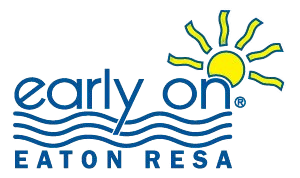Early On Intervention Services
Support for Infants and Toddlers: Early On Early Intervention Services
 Early On provides support for families with children from birth to age 3 who have developmental delays or are at risk due to a diagnosed medical condition or disability.
Early On provides support for families with children from birth to age 3 who have developmental delays or are at risk due to a diagnosed medical condition or disability.
Early intervention focuses on helping families support their child’s development during the first three years of life—when key skills such as moving, talking, and social interaction typically emerge.
Early On partners with families to connect them to the services and resources their child needs. Services are free, and there are no income eligibility requirements.
What is a Developmental Delay?
A developmental delay is seen when a child’s rate of growth and learning is different from that of most children the same age.
A developmental delay may be in one of the following areas:
- Thinking
- Talking
- Hearing
- Seeing
- Moving
- Taking care of basic needs
- Responding to others
Who Can Receive Early On Services?
Early On is available to any Eaton County family with a child from age 0-3 who has a developmental delay or an established medical condition.
Who Can Refer a Child? / How Do I Make Referral?
Any concerned adult may make a referral for a child if they suspect a developmental delay or if the child has a pre-existing health condition(s). (for ages 0-3 only)
Developmental Milestones
Each baby goes through developmental stages but remember, no two children develop and grow at exactly the same pace. The guide below lists a few thing you can look for as you watch your child's growth and development.
By 2 months your baby should...
- Hold head erect, bobbing when supported in sitting position
- Imitate or respond with occasional smile to smiling person
- Follows a moving person with their eyes
- Vocalize
- Move both legs and arms equally well
By 4 months your baby should...
- Have good head control
- Roll from side to side
- Begin reaching
- Laugh aloud
- Take objects, such as a rattle, when held near hand
- Follow moving objects when held in sitting position
- Enjoy play
By 6 months your baby should...
- Sit with a little help
- Roll from back to stomach
- Support weight; bounce activity
- Babble - more than 2 sounds
- Hold 1 toy and reach for another
By 9 months your baby should...
- Sit alone - change position without falling
- Creep or crawl on all fours
- Express affection
- Hold 2 objects at the same time
- Say mama/dada
- Show fear of strangers
By 12 months your baby should...
- Pull self up to standing - may take steps with support
- Pick things up with thumb and 1 finger
- Put toy in another
- Give toy on request
- Give affection
- Follow simple directions accompanied by gestures
- Say 2 or 3 words
By 2 years your toddler should...
- Kick a large ball
- Turn pages of a book
- Imitate housework
- Ask for items by name
- Recognize familiar pictures and know if it is upside down
- Use 2 or 3 words together, such as "more juice
By 3 years your toddler should...
- Walk up stairs
- Stand momentarily on 1 foot
- Jump up with both feet
- Feed themselves
- Put on a coat with help
- Verbalize toilet needs
Frequently Asked Questions
What is Early On®?
Early On® is a program of the Michigan Department of Education. Early On® assists families seeking help for infants and toddlers with chronic health issues and/or developmental delays. The program is open to infant and toddlers under three who live in the school districts of Charlotte, Grand Ledge, Potterville, Eaton Rapids, and Maple Valley. Most services are available year round.
How is a child referred to the Early On® system?
Perhaps your child is ill or seems to be slow in smiling, sitting up, or speaking. Your baby may have a physical condition such as cerebral palsy or a heart defect that is discovered shortly after birth. Sometimes health problems such as asthma or hearing loss may develop in the first year. Maybe you have begun to notice that your baby seems to act differently than other children.
The Early On® program depends on you or someone else noticing that your child may have special needs. A relative, baby sitter, doctor, public health nurse, or others in the community may suggest Early On®. The process begins with a phone call to the Eaton County Early On® at 517.541.8937.
You will be asked about your concerns. The next step is for Early On® to determine if your child is eligible for services. The referral must be made within two days of your call. If eligible, your child will receive a free evaluation and a wide range of services.
What services does Early On® offer?
Early On® Coordinators are located in each county and are available to help a parent decide if they want to enter the Early On® system. Here are the four steps:
- Evaluation - If it is suspected that a child has a developmental delay or a condition that could lead to such delay, an evaluation is initiated.
- Individualized Family Service Plan - If the child is eligible for Early On® services, an Individualized Family Service Plan (IFSP) is developed. The IFSP addresses the developmental needs of the child as well as the needs of the family helping the child.
- Service Coordination - An Early On® Service Coordinator helps the parent coordinate the services outlined in their child's plan.
- Implementation - Services outlined in the IFSP are implemented with permission of parent.
Examples of services that may be offered by Early On® include:
This program uses a home-based approach. Instruction is generally provided in one-hour settings by a professional staff who operate as a team with family members. Parents carry out the majority of instruction within the home setting. Parents may be invited to group programs to observe and participate with the children in small group settings, meet other parents, and receive support from staff members and other parents. Parents are the critical link in the Early On® Program. As full partners on the team, parents are included from the very beginning in determining goals, designing the program, and the final evaluation.
- family training (skill building)
- home visits
- speech pathology
- audiology
- occupational therapy
- physical therapy
- psychological services
- diagnostic
- medical services
- health services
- nursing services
- vision services
- transportation
- assistive technology devices and services
- nutritional counseling
- counseling (family, group or individual)
What is the cost? Are there any income restrictions?
There is no charge to families for an evaluation, the development of an IFSP, or service coordination. Most services outlined in IFSP are available at no cost, but that is determined individually. Early On® is available regardless of income.
Why is Early On a leader in developing relationships?
Family-centered care is the set of beliefs and principles that are the foundation for Early On®. Family-centered care is a new way of thinking about and working with children and their families. At the heart of family-centered care is the recognition that the family is the constant in the child's life. Family-centered care builds equal partnerships between families and professionals and promotes trust and respect. Family-centered care honors the priorities, choices, and resources of the family. Both families and professionals think that working with this set of beliefs and principals will create the brightest futures for our children and families.
Parent Community Resources
Central Michigan 211
United Way-Central Michigan 211 links individuals with health and human service information. We can link you to counseling, disaster services, shelter, food, rent/mortgage assistance, health care, youth programs, senior citizens programs, utility assistance, substance abuse services, volunteer information, literacy and language services, domestic violence, child abuse and neglect, tax assistance, places to donate goods, services for those with disabilities, personal, and household needs. Dial 211or 566.561.2500 for cell or pay phone users.
Barry-Eaton District Health Department
Immunizations, Children's Special Health Care Services, Family Planning Clinic, WIC, discount prescription plan, primary care clinic, and other health related services. Call 517.543.2430 or 517.485.7110 for more information.
Bridges 4 kids
A non-profit parent organization providing a comprehensive system of information and referral for parents and professionals working with children from birth through transition to adult life. Bridges4Kids also supports non-profits that share our mission with web design, data collection, telephone referral services, and technical assistance.
Head Start
Comprehensive, free preschool program for low income, including bilingual, or handicapped children 3-5 years old. Parent education and support available. Transportation usually provided. Call 800.585.9997 for more information.
Community Mental Health
Services include individual or family counseling and home-based services for families with infants, toddlers, and/or preschoolers experiencing social, emotional, or behavioral distress. Home-based services and counseling also available. Call 517.346.8318 or 888.800.1559 for more information.
Michigan Department of Human Services
Financial support for children whose families meet eligibility guidelines for Temporary Assistance for Needy Families (formerly AFDC). Emergency Needs Program, Food Stamps, Medicaid, and other financial and social services needs. Call 517.543.0860 for more information.
Building Strong Families
Building Strong Families is a personal activity-centered parenting education program for families with children birth to five years of age. Call 517.543.2310 or 517.372.5594 for more information.
Office for Young Children
A regional child care and referral agency which assists parents in finding day care providers, preschool or school-age programs, and provides information on financial assistance for parents using child care. Call 517.887.4319 or 800.234.6966 for more information.





